)
The business structure begins with a plan. It turns vague ambition into defined steps, aligns vision with action, and challenges assumptions before they cost too much. A strong plan doesn’t just organize—it sharpens. This is where business plan examples become useful. They offer real-world clarity at the moment it's needed most.
By showing how others have mapped strategy, addressed risk, and shaped their path forward, these examples give early-stage founders something rare: a starting point grounded in experience.
What Is a Business Plan Example and Why Does It Matter?
When you’re trying to build a business, it’s not always obvious where to begin. You know what you want to create, but turning that into a step-by-step plan can feel like assembling something without the picture on the box.
That’s where business plan examples help. It gives you the picture. You’re not guessing what goes where—you’re seeing how someone else laid it out, how they moved from idea to structure, how they made choices about what to include and what to leave out. This sample serves as an effective example of the business plan in action, showing how strategy and execution align. And suddenly, the pieces make more sense. You’re not looking at a blank page anymore. You’re thinking more clearly. You’re making better decisions, because you’re building on something that already holds together.
That’s the value. Not in copying, but in seeing the logic behind a real plan—and using that to sharpen your own. By studying a real-world example of business plan structure, founders can better understand what to include and why.
Business Plan Examples That Show What Real Planning Looks Like
When you're building something from the ground up, a clean template isn't always enough. You need to see how real businesses take shape—how structure supports ambition, how strategy connects across sections, and how every part of a plan contributes to a larger vision.
PrometAI provides business plan template examples that are professionally structured and easy to customize for any industry. Even at the very beginning of your plan, having a clear direction matters. A well-written business plan executive summary example helps set the right tone by introducing your mission, outlining your goals, and framing the opportunity ahead. Reviewing an example of executive summary in a business plan can show how to capture that information in a concise, compelling way that invites interest—and builds confidence.
The examples below reflect that kind of thinking. Each one represents a different industry, but they all share a common foundation: clarity, logic, and purpose.
Food Truck Business Plan Example
Starting a food truck business is fast-paced, exciting—and surprisingly complex. From concept to execution, each decision carries weight. That’s why having a complete food truck business plan template isn’t optional—it’s essential.
PrometAI’s food truck business plan example simplifies the process by providing a clear, editable structure. You’re not starting from scratch—you’re working with a framework that includes:
A structured format to ensure no key detail is overlooked.
Customizable content tailored to fit your menu, model, and goals.
Time-saving prompts to guide you through sections efficiently.
A professional, polished layout ready to present to partners or investors.
Strategic insights into market research, marketing, and financial planning.
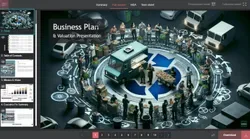
With the food truck business plan sample, you’ll cover every major component with precision. It walks you through your mission, operations, location strategy, staffing, marketing approach, and funding needs—all in one place.
Looking through food truck business plan examples can reveal how layout, location, and cost forecasting work together. And when it comes to numbers, clarity matters. The template includes forecasting tools and a break-even analysis to help you plan realistically and present with confidence.
Whether you’re building a specialty truck, a mobile coffee brand, or an all-day street food concept, this business plan gives your ideas structure—and your launch real direction. In uncertain markets, even small businesses benefit from a business continuity plan example to prepare for potential disruptions.
Coffee Shop Business Plan Example
Opening a coffee shop often begins with a vision—a welcoming space, a signature menu, a steady crowd. But turning that into a business takes more than good taste. It takes structure, timing, and a clear understanding of how to make it all work.
That’s where a well-crafted coffee shop business plan template makes a difference. It brings the entire concept into focus. You see how the idea takes shape on paper—how the brand is positioned, how the operations are mapped, and how every detail supports the larger strategy.
PrometAI’s coffee shop business plan example is designed to guide new founders through that process with confidence. It offers a clear structure and customizable sections that reflect the real needs of a modern coffee business. From layout design and supplier sourcing to pricing models and customer engagement, the content helps translate vision into action.

The included coffee shop business plan PDF takes it further. It shows how smart planning handles everything from financial projections to competitive positioning. It helps you define what makes your space unique and how to turn that into a repeatable, scalable experience.
And while the plan covers launch essentials, it also supports long-term thinking. You’ll start with focus, but you’ll also build with flexibility—ready to adapt, grow, and stay relevant in a competitive market. That’s what a strong example makes possible: clarity from day one, and strategy that lasts. These business plan examples for startups are crafted to help new founders create clarity, strategy, and structure from day one.
Bakery Business Plan Example
Starting a bakery isn’t just about recipes—it’s about rhythm. Timing, precision, and preparation define the work long before customers walk through the door. And those same qualities shape how a strong business plan comes together.
A bakery business plan template lets you step into that process early. It shows how a real bakery took shape on paper—where the vision met structure, and where creative ideas were tested against real constraints.
PrometAI’s bakery business plan example simplifies that path with a guided format that covers:
Concept & Differentiation - What you bake, how it stands out, and who it's for
Market Positioning - Research-backed insight into your location, customer base, and competition
Operations Planning - How you’ll manage staffing, sourcing, equipment, and daily workflow
Marketing Strategy - Tactics for local outreach, seasonal promotions, and building loyal regulars
Financial Projections - Startup costs, revenue forecasts, expense tracking, and break-even analysis
Funding Requests - Clear, professional summaries of how much you need, how you’ll use it, and when it returns
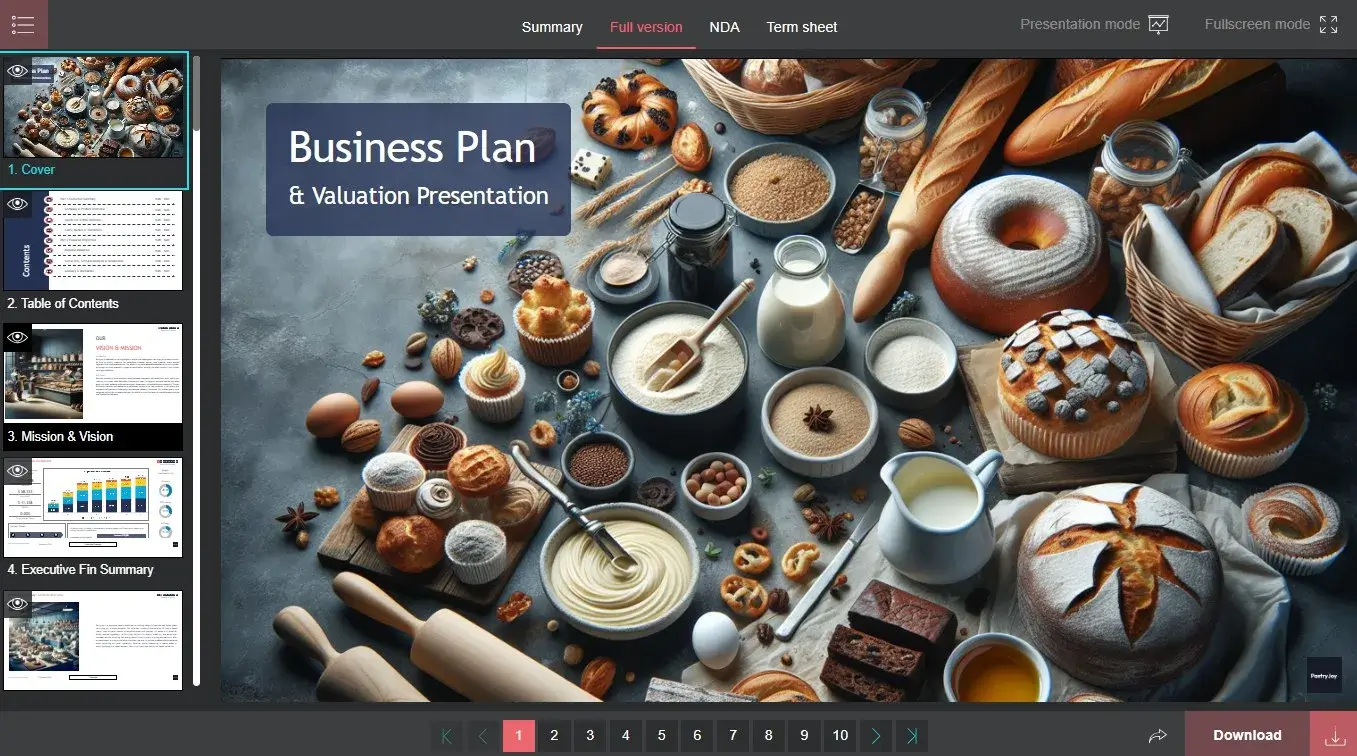
With the bakery business plan PDF as a reference, you’re not just organizing your thoughts—you’re learning how a working plan feels. You see how sections connect, how goals are framed, and how structure supports creativity without limiting it. That’s the real value. Not just a polished document—but a plan you can actually build from.
Restaurant Business Plan Example
A restaurant may begin with a vision—but it runs on planning. A clear, well-structured business plan is what turns ideas into operations, and ambition into action.
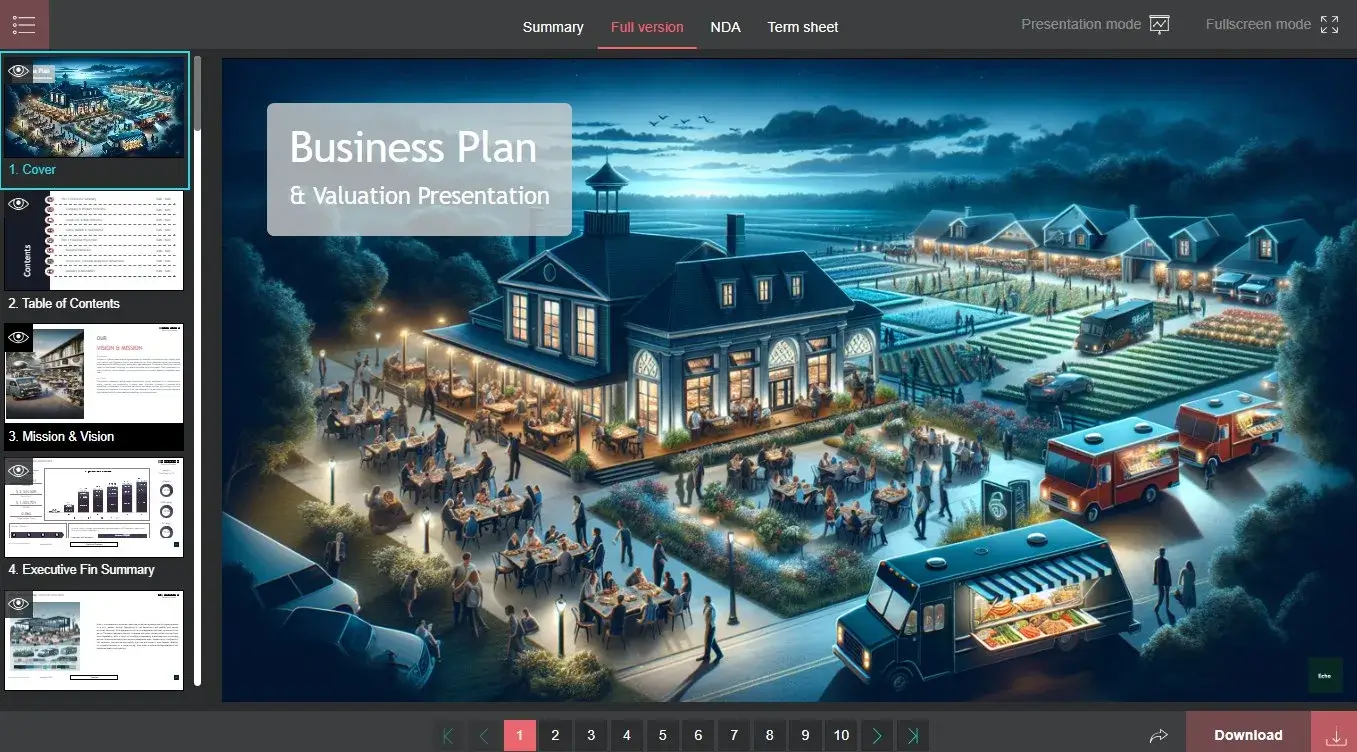
PrometAI’s restaurant business plan example is built around that principle. It simplifies complex decisions and reveals the details that shape long-term success:
Structure that drives clarity - The template walks through each decision point—concept, brand, layout, model—ensuring that every part of the business is connected from the start.
Investor-ready design - This isn’t a static form—it’s a communication tool. By organizing your thinking professionally, the plan becomes a polished, confident pitch to investors or lenders.
Financial forecasting with purpose - The plan helps you look beyond startup costs. It challenges you to defend your revenue streams, align expenses, and prove financial sustainability early on.
Built-in adaptability - Whether you’re launching a fine dining concept, a fast-casual chain, or a local bistro, the format adapts to the complexity of your model without losing focus.
Momentum from day one - A finished restaurant business plan example doesn’t just inform you—it pushes you. It reveals what’s ready and what still needs work. And most importantly, it gets you moving.
In a space defined by detail, experience, and high margins for error, this kind of structured planning is foundational.
Daycare Business Plan Example
Planning a daycare isn’t just about meeting demand—it’s about meeting expectations. Families, regulators, and funders all want to see structure, vision, and care. A strong daycare business plan example brings that structure to life.
Whether you’re launching a children’s day care center or building out services for adult care, the process begins the same way—with a plan that defines every detail, from purpose to operations to finances.
Why PrometAI’s Daycare Business Plan Template Stands Out
Simple, customizable structure - No fluff. Just a well-built framework you can adapt for small home-based centers or large-scale facilities.
Designed for both child and adult day care models - Whether you're managing early childhood care or adult-focused programs, the sections guide you through unique operational requirements.
Fully investor-ready - The template includes clean formatting and structured forecasting tools—making your plan easy to understand and present with confidence.
Comprehensive planning coverage - You’ll cover every key area:
Executive Summary
Market & Demographic Analysis
Operational Systems
Services Offered
Marketing & Outreach Strategy
Financial Forecasts
Funding Requests
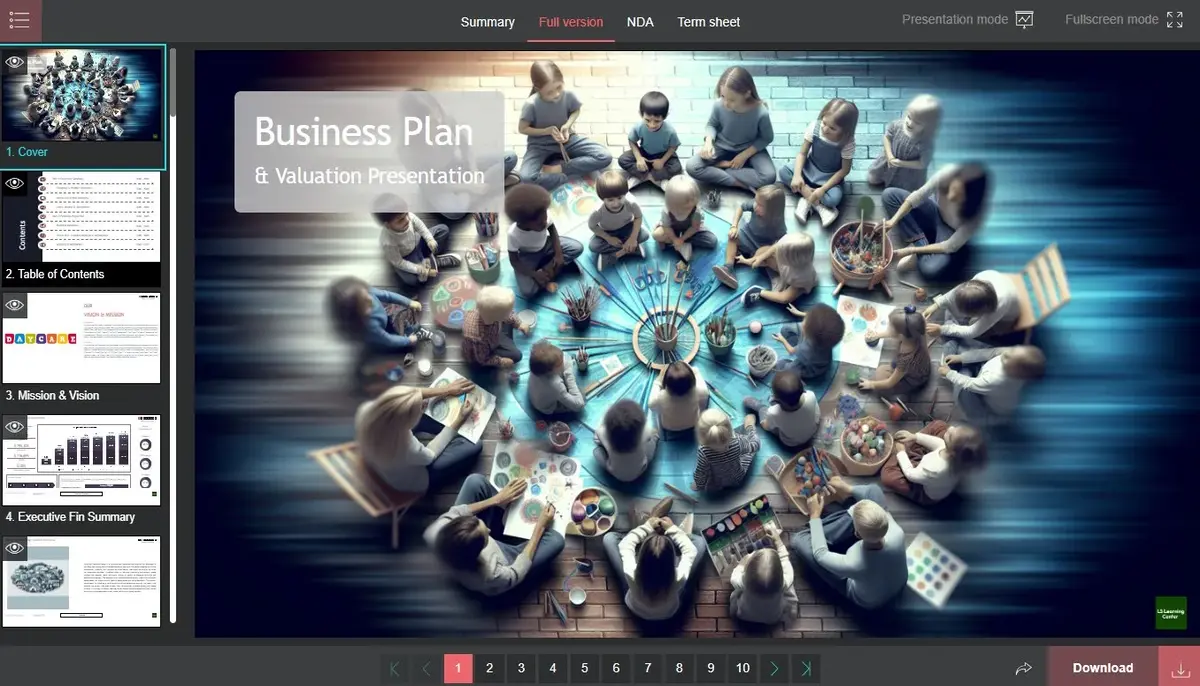
What a Daycare Business Plan Example Reveals
A sample makes the difference between guessing and planning. It shows how to define your care philosophy, communicate your services clearly, and address regulatory and safety considerations upfront. You see how everything connects—from staffing ratios to service pricing to long-term growth plans.
For adult day care centers, a sample also highlights how to align care services with community needs, outline medical and social support structures, and prepare for multi-channel funding strategies.
When structure is this important, guessing is too risky. A complete day care business plan template doesn’t just guide—it protects your vision. It ensures your business opens with clarity and grows with control.
Clothing Retail Business Plan Example
In retail, momentum comes fast—but without a clear plan, it doesn’t last. Many clothing stores open with energy, creativity, and a strong visual concept—but struggle to scale because the foundation was never fully built. That’s the difference a solid clothing retail business plan template can make.
Without a plan:
The store’s concept feels clear—until it's time to explain it to investors.
Inventory gets ordered, but there's no pricing strategy or sourcing logic.
The layout looks appealing, yet customers aren’t converting into repeat buyers.
Marketing takes off, but without timing, targeting, or consistency.
The store launches, but there’s no timeline for measuring progress or profitability.
With a structured plan:
The brand identity is defined—mission, market, style, and positioning all aligned.
Inventory decisions are based on pricing models, supply planning, and customer demand.
Market research informs every aspect of the offering, from trends to target behavior.
Marketing channels are mapped with purpose: digital, local, seasonal, and promotional.
Financial projections highlight revenue goals, operating costs, and breakeven timing.
Investors see clarity—not just in vision, but in execution and long-term scalability.
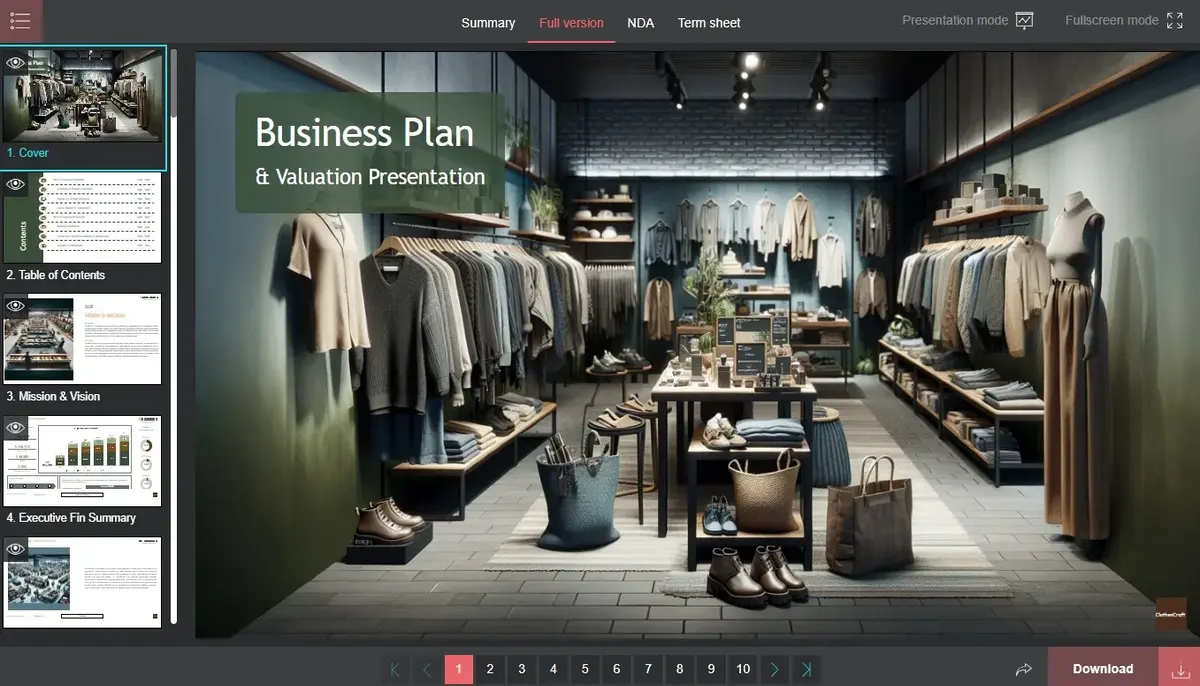
PrometAI’s clothing retail business plan example delivers all of this in one polished, customizable PDF. It helps founders move from vision to execution—faster, smarter, and with fewer blind spots.
For anyone serious about launching a store that lasts, this isn’t just a tool. It’s the difference between opening—and staying open.
Event Planning Business Plan Example
Events are built on precision. Timelines, vendors, budgets, expectations—everything must run in sync. That same structure is what separates a professional event planning company from a hobby.
A strong event planning business plan example provides that structure long before the first client walks in.
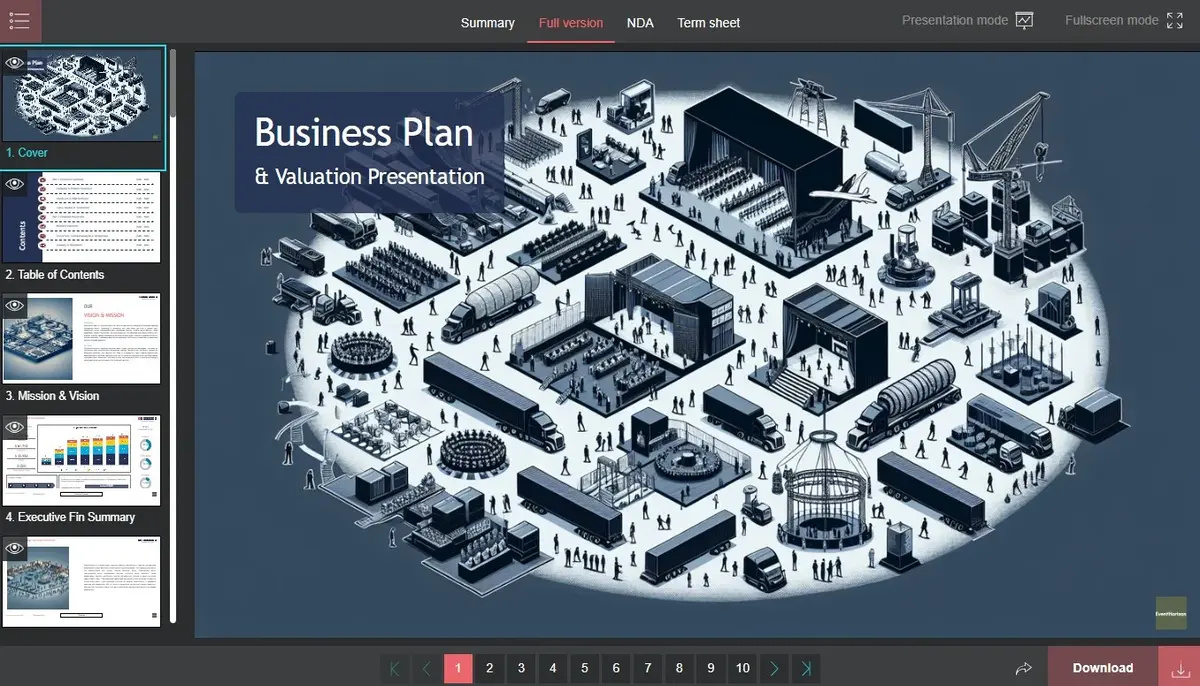
Start with your niche
Not all events are the same. The first step is defining what you’re great at—corporate functions, weddings, conferences, or custom experiences. The plan helps you position your services with clarity.
Outline your offering
PrometAI’s event planning business plan template guides you through service structure: what you offer, how it’s delivered, and how it scales. You define packages, staffing needs, pricing logic, and vendor relationships in one cohesive system.
Map your market
You’re not just planning events—you’re solving problems. The plan walks you through market analysis, showing you how to align your services with actual demand and stand out from the competition.
Build financial confidence
Revenue can vary in event-based industries. That’s why the plan includes forecasting tools built specifically for event management—covering budgets, seasonal trends, fixed vs variable costs, and funding needs.
Design a launch that moves
The template doesn’t stop at setup. It helps you define how your business will launch—what happens in month one, where you’ll acquire clients, and how you’ll build long-term growth into every decision.
No experience? No problem.
The included event management business plan sample is designed to help even first-time founders. With built-in guidance, professional formatting, and intuitive sections, the path becomes less overwhelming—and far more actionable.
Whether you’re building a high-end event agency or planning personal celebrations on a lean budget, a complete business plan turns vision into a system. With PrometAI’s template, you start organized, stay focused, and grow with purpose.
Conclusion
Planning is where real progress begins. It sharpens your vision, strengthens your decisions, and turns potential into a clear path forward. With the right structure, even the most ambitious ideas become practical, focused, and ready to grow.
Starting a business is rarely easy, but with clarity on your side, it becomes far more possible. A solid plan brings alignment between where you are and where you’re going—and that kind of direction is what gives every serious venture its edge.
FAQ
1. What is an example of a business plan?
An example of a business plan is a completed document that outlines a real company’s strategy, financials, operations, and goals. It shows how the pieces fit together and offers a reference for building your own plan.
2. Why are business plan examples important for startups?
Business plan examples for startups help new founders avoid guesswork. They demonstrate how to define a concept, present financial forecasts, and build a plan that aligns with long-term goals.
3. What makes a strong executive summary in a business plan?
A strong executive summary introduces your business, defines your mission, outlines key objectives, and previews your strategy. Reviewing a business plan executive summary example can help ensure yours is both clear and compelling.
4. How do industry-specific business plan examples help?
Industry-specific examples—like a bakery, food truck, or daycare business plan—show how to adapt structure and strategy to different markets. They highlight the real considerations unique to each type of business.
